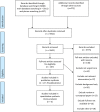Digital and online symptom checkers and health assessment/triage services for urgent health problems: systematic review
- PMID: 31375610
- PMCID: PMC6688675
- DOI: 10.1136/bmjopen-2018-027743
Digital and online symptom checkers and health assessment/triage services for urgent health problems: systematic review
Abstract
Objectives: In England, the NHS111 service provides assessment and triage by telephone for urgent health problems. A digital version of this service has recently been introduced. We aimed to systematically review the evidence on digital and online symptom checkers and similar services.
Design: Systematic review.
Data sources: We searched Medline, Embase, the Cochrane Library, Cumulative Index to Nursing and Allied Health Literature (CINAHL), Health Management Information Consortium, Web of Science and ACM Digital Library up to April 2018, supplemented by phrase searches for known symptom checkers and citation searching of key studies.
Eligibility criteria: Studies of any design that evaluated a digital or online symptom checker or health assessment service for people seeking advice about an urgent health problem.
Data extraction and synthesis: Data extraction and quality assessment (using the Cochrane Collaboration version of QUADAS for diagnostic accuracy studies and the National Heart, Lung and Blood Institute tool for observational studies) were done by one reviewer with a sample checked for accuracy and consistency. We performed a narrative synthesis of the included studies structured around pre-defined research questions and key outcomes.
Results: We included 29 publications (27 studies). Evidence on patient safety was weak. Diagnostic accuracy varied between different systems but was generally low. Algorithm-based triage tended to be more risk averse than that of health professionals. There was very limited evidence on patients' compliance with online triage advice. Study participants generally expressed high levels of satisfaction, although in mainly uncontrolled studies. Younger and more highly educated people were more likely to use these services.
Conclusions: The English 'digital 111' service has been implemented against a background of uncertainty around the likely impact on important outcomes. The health system may need to respond to short-term changes and/or shifts in demand. The popularity of online and digital services with younger and more educated people has implications for health equity.
Prospero registration number: CRD42018093564.
Keywords: symptom checkers; systematic reviews; urgent care.
© Author(s) (or their employer(s)) 2019. Re-use permitted under CC BY. Published by BMJ.
Conflict of interest statement
Competing interests: None declared.
Figures
Similar articles
-
Digital and online symptom checkers and assessment services for urgent care to inform a new digital platform: a systematic review.Southampton (UK): NIHR Journals Library; 2019 Aug. Southampton (UK): NIHR Journals Library; 2019 Aug. PMID: 31433612 Free Books & Documents. Review.
-
The quality, safety and governance of telephone triage and advice services - an overview of evidence from systematic reviews.BMC Health Serv Res. 2017 Aug 30;17(1):614. doi: 10.1186/s12913-017-2564-x. BMC Health Serv Res. 2017. PMID: 28854916 Free PMC article.
-
Folic acid supplementation and malaria susceptibility and severity among people taking antifolate antimalarial drugs in endemic areas.Cochrane Database Syst Rev. 2022 Feb 1;2(2022):CD014217. doi: 10.1002/14651858.CD014217. Cochrane Database Syst Rev. 2022. PMID: 36321557 Free PMC article.
-
Service use, clinical outcomes and user experience associated with urgent care services that use telephone-based digital triage: a systematic review.BMJ Open. 2022 Jan 3;12(1):e051569. doi: 10.1136/bmjopen-2021-051569. BMJ Open. 2022. PMID: 34980613 Free PMC article.
-
The diagnostic and triage accuracy of digital and online symptom checker tools: a systematic review.NPJ Digit Med. 2022 Aug 17;5(1):118. doi: 10.1038/s41746-022-00667-w. NPJ Digit Med. 2022. PMID: 35977992 Free PMC article. Review.
Cited by
-
Exploratory study: Evaluation of a symptom checker effectiveness for providing a diagnosis and evaluating the situation emergency compared to emergency physicians using simulated and standardized patients.PLoS One. 2023 Feb 24;18(2):e0277568. doi: 10.1371/journal.pone.0277568. eCollection 2023. PLoS One. 2023. PMID: 36827277 Free PMC article.
-
Triage Accuracy of Symptom Checker Apps: 5-Year Follow-up Evaluation.J Med Internet Res. 2022 May 10;24(5):e31810. doi: 10.2196/31810. J Med Internet Res. 2022. PMID: 35536633 Free PMC article.
-
A Utility Framework for COVID-19 Online Forward Triage Tools: A Swiss Telehealth Case Study.Int J Environ Res Public Health. 2022 Apr 24;19(9):5184. doi: 10.3390/ijerph19095184. Int J Environ Res Public Health. 2022. PMID: 35564576 Free PMC article.
-
Longitudinal Changes in Diagnostic Accuracy of a Differential Diagnosis List Developed by an AI-Based Symptom Checker: Retrospective Observational Study.JMIR Form Res. 2024 May 17;8:e53985. doi: 10.2196/53985. JMIR Form Res. 2024. PMID: 38758588 Free PMC article.
-
An artificial intelligence-based first-line defence against COVID-19: digitally screening citizens for risks via a chatbot.Sci Rep. 2020 Nov 4;10(1):19012. doi: 10.1038/s41598-020-75912-x. Sci Rep. 2020. PMID: 33149198 Free PMC article.
References
-
- NHS England. NHS 111 minimum data set 2018-19. 2018. https://www.england.nhs.uk/statistics/statistical-work-areas/nhs-111-min... (accessed 29 Oct 2018).
-
- NHS England. Five year forward view. NHS England: Leeds, 2014.
-
- NHS England. Next steps on the NHS Five Year Forward View. NHS England: Leeds, 2017.
-
- NHS England. Sustainability and transformation partnerships. 2019. https://www.england.nhs.uk/integratedcare/stps/ (accessed 25 Mar 2019).
Publication types
MeSH terms
Grants and funding
LinkOut - more resources
Full Text Sources
Other Literature Sources
Medical
Molecular Biology Databases
Miscellaneous

